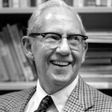
Author: George J. Stigler
George Joseph Stigler (1911 - 1991) was a U.S. economist. He won the Nobel Memorial Prize in Economic Sciences in 1982, and was a key leader of the Chicago School of Economics, along with his close friend Milton Friedman.
While at Chicago, he was greatly influenced by Frank Knight, his dissertation supervisor. Friedman, a friend for over sixty years, comments upon it as remarkable since only three or four students ever managed to complete their PhD dissertation under Knight in his 28 years at Chicago. Jacob Viner and Henry Simons also influenced him and, among his students, W. Allen Wallis and Milton Friedman.
Stigler is best known for developing the Economic Theory of Regulation, also known as capture, which says that interest groups and other political participants will use the regulatory and coercive powers of government to shape laws and regulations in a way that is beneficial to them. This theory is a component of the public choice field of economics. He also carried out extensive research in the history of economic thought.
Stigler's most important contribution to economics was disseminated in his landmark article titled "The Economics of Information". According to Friedman, Stigler "essentially created a new area of study for economists." In this article, Stigler stressed the importance of information by writing, "One should hardly have to tell academicians that information is a valuable resource: knowledge is power. And yet it occupies a slum dwelling in the town of economics."
His 1962 article "Information in the Labor Market" developed the theory of search unemployment.
He was known for his sharp sense of humor, and wrote a number of spoof essays. In his book The Intellectual and the Marketplace, for instance, he proposed Stigler's Law of Demand and Supply Elasticities, that "all demand curves are inelastic and all supply curves are inelastic too." The essay referenced studies that found many goods and services to be inelastic over the long run, as well as offering a supposed theoretical proof; he ended by announcing that his next essay would demonstrate that the price system does not exist. Another essay, on "Truth in Teaching," described the consequences of a (fictional) set of court decisions that held universities legally responsible for the consequences of teaching errors.
The Stigler diet was named after him.
Stigler was born in Seattle, Washington, graduated from the University of Washington in 1931 with a B.A and then spent a year at Northwestern University from which he obtained his M.B.A in 1932. It was during his studies at Northwestern that Stigler developed an interest in economics and decided on an academic career.
Due to a tuition scholarship that he received from the University of Chicago, Stigler enrolled at the university in 1933 to study economics and went on to earn his Ph.D. in economics from the University of Chicago in 1938. His teaching experience began in 1936 at Iowa State College where he taught until 1938. He spent much of World War II at Columbia University, performing mathematical and statistical research for the Manhattan Project. He then spent one year at Brown University. He served on the Columbia faculty from 1947 to 1958.
Stigler was a founding member of the Mont Pelerin Society, and was president from 1976 to 1978.
He also received National Medal of Science in 1987.
Publications
Publications
Stigler, George J. (1951): The Division of Labor is Determined by the Extent of the Market. In Journal of Political Economy, 59 (3) pp. 185-193.